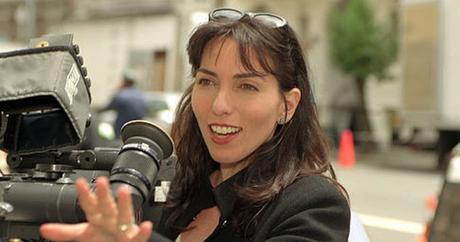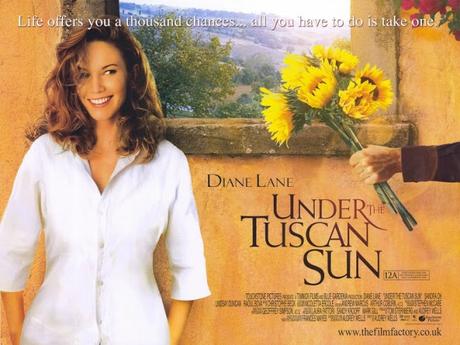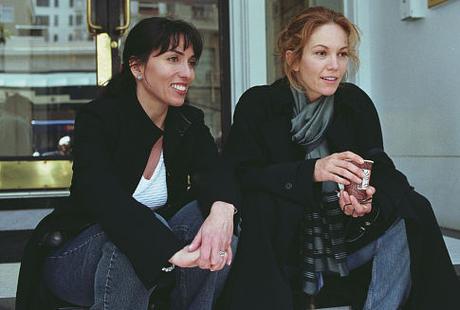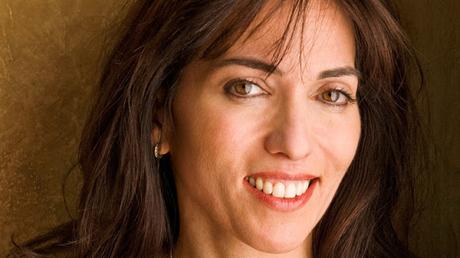
I interviewed Audrey Wells for Venice Mag in 2003. She had the looks of a leading lady and the IQ of a rocket scientist. Needless to say, I was deeply smitten after our chat. She was lovely inside and out, a real sweetheart who could talk endlessly, with authority, on a variety of topics. Her final screenplay, "The Hate U Give," directed by George Tillman, Jr., was released the day she passed, October 5, 2018, after a long and courageous battle with cancer. She was 58. A huge loss. RIP.
AUDREY WELLS: HERE COMES THE SUN
By
Alex Simon
Audrey Wells is what many might refer to as “ubergifted.” Blessed with the looks of a leading lady and the kind of talent that has won major awards, the divine Ms. Wells is currently bowing with her second cinematic effort as writer/director, the romantic fable Under the Tuscan Sun. The film, adapted from the book by Frances Mayes, stars a radiant Diane Lane as a recently-divorced American who tries to start life anew amid the rustic beauty of Tuscany. A most-welcome addition to the ever-shrinking canon of films aimed at intelligent adults, the Touchstone release is currently playing in theaters.
Born and raised in San Francisco, Audrey attended UC Berkeley as an undergrad and did her Master’s in film at UCLA. Initially making her mark as a screenwriter, Audrey scored big with the hit comedy The Truth About Cats and Dogs (1996) and the goofball comedy George of the Jungle (1997) before debuting as a writer/director with the indie hit Guinevere (1999), about the May-December romance between an alcoholic photographer (Stephen Rea) and his latest protégée (Sarah Polley). The film captured the prestigious Waldo Salt Screenwriting Award at the 1999 Sundance Film Festival, and was a hit with critics and the arthouse crowd the world over. Audrey next penned the Disney-Bruce Willis hit The Kid, about a hard-driving yuppie who encounters himself as a pre-pubescent boy, learning some valuable life lessons in the process. Audrey’s latest screenplay is an adaptation of the Japanese hit Shall We Dance, starring Richard Gere and Jennifer Lopez.
The stunning Ms. Wells took some time to relax with Venice on the balcony of a Century City penthouse recently, and reflected on her remarkable body of work past, present and future.

VENICE: Tell us about the genesis of Tuscan Sun. I know it’s loosely based on a non-fiction book.
Audrey Wells: Right. The book “Under the Tuscan Sun” was a best-seller. The author of the book, Frances Mayes, is a really talented writer, and also a novelist, so she knew the book lacked the sort of structure that would work as a narrative film. When the book was given to me, I had been working on an idea of my own about a woman overcoming heartbreak. I wanted to do something about what happens between the day you wish you were dead and the day you’re happy to be alive again. Once Frances knew what I was about, I think she trusted me to adapt the screenplay. She actually didn’t she what I had done until she saw the finished film.
What I loved about the movie was that it was serendipitous and also messy, which is how real life is. So many romantic films, or “chick flicks,” are so chock full of unbelievable elements from the start, but this felt very real.
I certainly felt I was trying to write about a part of the human condition that really amazed me. A lot of people get remarried. Think how scary that is, making that commitment of “’til death do part” with someone when you’ve done it once before, and parted long before death. It probably knocked the shit out of you. Divorce is pretty common, but they don’t really talk about how devastating it is. Yet people get up, dust themselves off and try it again, so I really wanted to look at what that process was about, and deal with it in a truthful way. I think the movie is really about how, if you give it a chance, happiness can creep back up on you.

Diane Lane seems to become a better actress with each passing year, and this is some of her best work to date. What was working with Diane like?
I have a lot to say about Diane. She is a fantastic human being. We worked together for 70 days, every one of which was terrific. We had a great collaboration. She’s kind. She’s professional. She’s hardworking. She’s collaborative. She’s supportive. She’s brilliant. She’s endlessly polite, even under duress. I really consider her my collaborator on this movie, not just my lead actress. She was my filmmaking partner, and really supported me. We worked closely together, but still respected each others’ boundaries. We never shared any personal stories or did any “female bonding,” we just focused on the work. On the last day of shooting, after we wrapped, we looked at each other and said simultaneously “I can’t wait to get to know you.” (laughs)
The film made several references to Fellini, and I remember reading that seeing Nights of Cabiria (1957) was a life-changing moment for you as a kid.
His films have had a huge impact, although you would never tell that by the way I make movies. I’m particularly enamored of the films he made which starred his wife, Giulietta Masina. He was making movies that had female protagonists going on journeys of self-discovery long before other filmmakers ever thought of doing it. The last 30 seconds of Nights of Cabiria have made an indelible impression on me…the way she picks herself up and the kids on the Vespas go by her and one of them says “Buena Sera!” She just starts to light up and gets that luminous look back in her eyes, and you just know she’s undefeatable, that she’s going to live on.
Lindsay Duncan was also amazing, in a very difficult part that could have easily slid into absurdity in the hands of the wrong actress.
Absolutely. Lindsay really grounded that character in reality and sanity, so the audience couldn’t dismiss her as some loony eccentric. We understood that it was her choice to dress like that, and be grand. It was a real decision she made in how to approach life. Lindsay was just terrific. That night she did the scene where she jumped into the fountain, it was so cold, and she was such a trooper. There’s actually a funny story about that fountain: we needed a big fountain on a heroic, classical scale, and there was no fountain like that in Cortona, where we were shooting, so we had to build it, which was a tall order for my production designer! When he designed the sculpture, he gave the male heroic figure on it an anatomically proportionate appendage. (laughs) So the guy was seriously hung, when most classical statuary has genitalia has been what they call “formalized,” meaning it was lopped off in religious fervor. Anyway, the statue created a huge stir in Cortona. The Bishop was up in arms about it, people were hanging things on it, then one of the newspapers there printed that I must be a Communist because the statue hung to the left. (laughs) At that point, I decided to order a reduction, especially because when Lindsay was in the fountain, if it was shot at certain angles, it would just look absurd, like an Austin Powers shot or something! (laughs)
You grew up in San Francisco. What did your parents do?
My dad’s a psychiatrist and my mom’s a psychologist. I’m psychotic. My parents are both European intellectuals. My dad’s from Austria, my mother from Romania. I was originally going to be a journalist and use my social-political take on the world to make documentaries. It turned out that I mostly write fiction, and write comedy, so things worked out a bit differently. (laughs)

The Kid was a movie that really touched a lot of people. Tell us about the genesis of that.
My very good friend is a screenwriter named Alan Sharp (Night Moves, Rob Roy). Alan was such a good friend, he basically refused to be my mentor. (laughs) One of his first statements to me was “Don’t worry Audrey, someday you’ll sell a screenplay, and then your problems will begin.” Alan said to me that we all basically have one song to sing, which we sing again and again. I think I tend to sing this song about healing the wounded, and I do it every time I write. The Kid came from a fantasy of my own where I wished I could talk with the 10 year-old self that I was.
Were you a geeky kid?
Oh God! Total nerd! Insane, reject, outside looking in nerd. But now I protect my nerd status. I think it’s the best thing I’ve got going for me! (laughs) I’ll stay here on the fringe, thank you very much!
Guinevere was an amazing film, particularly as a directing debut. Tell us about the genesis of that.
I think I’m a romantic and interested in defending love, even when it comes in objectionable forms. I wanted to look at what is generally considered a prurient, objectionable and distasteful relationship: when two people of very different ages get together. I wanted to turn that crystal in the light and have all those different refractions come off it so we saw it in a different way. I also feel it was an important coming of age story. I think a lot of women have the experience of being shaped by someone that you love for having given that to you but that you must abandon, and quickly! It was an amazing experience. We shot it in 28 days. All the actors were amazing.
Especially Jean Smart, whose performance as Sarah Polley’s mother was the most venom-filled matriarchal figure in film since Angela Lansbury in The Manchurian Candidate (1962).
She was amazing, and what’s amazing about Jean is that was a complete and total performance. She’s actually the sweetest, most gentle person in the world. That’s what I love about actors: I love what they can do. Sandra Oh is nothing like her part in Under the Tuscan Sun, for example.
What advice would you have for a first-time director?
This won’t sound particularly Earth-shattering, but the script has to be ready, 100%. The crew has to be the absolute best you can possibly put together. Casting is the most important thing in the world, so have specific people in mind that you want to work with. Casting can make or break you. I really believe in the other people. Movies are only as good as the sum of their parts. I believe in the talents of my casting directors, my D.P., my production designers, editors, those are all such important decisions. It’s like the old adage of surrounding yourself with people smarter than yourself. That’s a director’s job: to receive the brilliance of all those around you.

